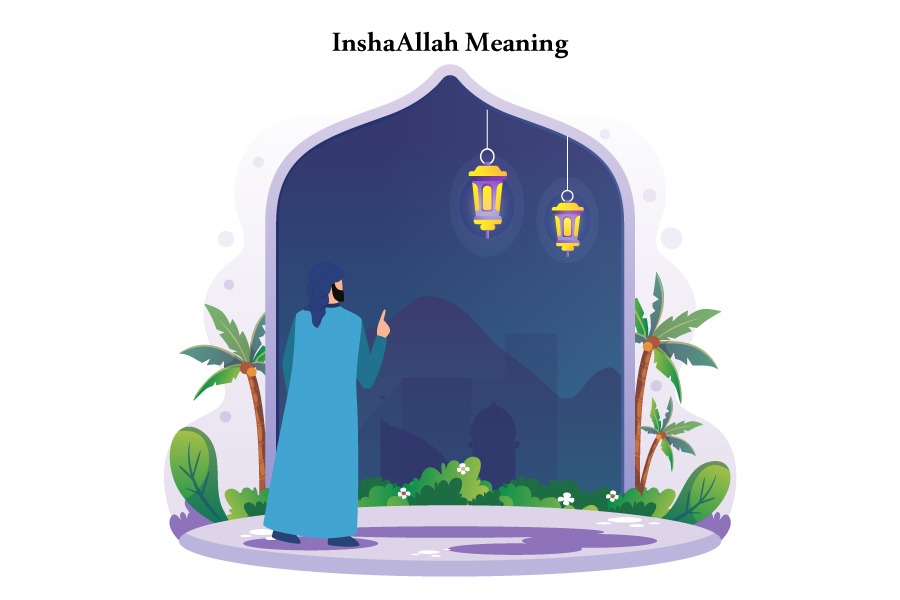Introduction
Let’s embark on a journey to understand the beautiful Arabic phrase, “Inshallah, “inshallah meaning in English, how and when to use it. This article will delve into the essence of this expression, exploring its meanings and the significance it holds in the Islamic faith and everyday life.
The Basics of Inshallah Meaning
Unpacking the Word
“Inshallah” (إن شاء الله) is an Arabic phrase that translates to “God willing” or “if God wills it” in English. It is a combination of three words:
“in” (if),
“sha” (will),
and “Allah” (God).
When spoken or written, it serves as a humble acknowledgment of the uncertainty of the future and the recognition that the will of Allah ultimately determines all outcomes.
Religious Significance of Inshallah
A Connection to Islamic Faith
The phrase “inshallah” holds deep religious significance in Islam. Muslims believe that Allah is the ultimate authority, and His will is what shapes the course of events in the world. By invoking “inshallah” in their conversations and plans, Muslims are reminding themselves of their faith’s core tenet – submission to the divine will. Inshallah meaning strengthens the faith in Allah.
In Prayers and Declarations
“Inshallah” is often used in Islamic prayers, supplications, and Quranic verses. It reflects a profound sense of humility and trust in God’s wisdom. Muslims use this expression when discussing future events, aspirations, or intentions to emphasize their reliance on God’s guidance and providence.
Hadith Emphasizing Inshallah Meaning
There are several hadiths (sayings and actions of the Prophet Muhammad, peace be upon him) that emphasize the importance of saying “Inshallah” (if Allah wills it) when making plans or discussing future events. Here are a few notable hadiths on the top of inshallah meaning:
Saying “Inshallah” for Future Plans:
Aisha (may Allah be pleased with her) reported that the Prophet Muhammad (peace be upon him) said: “If Allah wills (Inshallah), then it will happen.” (Sahih al-Bukhari)
This hadith highlights the importance of acknowledging Allah’s will when making plans for the future.
The Importance of Saying “Inshallah”:
Ibn Abbas (may Allah be pleased with him) reported that the Prophet Muhammad (peace be upon him) said: “If anyone of you makes a decision, he should say ‘Inshallah’ (if Allah wills), and when someone says ‘Inshallah,’ he should not say, ‘I will do so and so,’ but should say, ‘I will do what Allah wills.'” (Sahih al-Bukhari)
This hadith emphasizes that one should use “Inshallah” when expressing their intentions and should always be aware of Allah’s ultimate control.
These hadiths serve as recommendations for Muslims to incorporate the phrase “Inshallah” into their daily lives as a way of acknowledging their reliance on Allah’s divine will and recognizing the uncertainty of the future. Inshallah meaning is a reminder of the importance of humility and trust in Allah’s plan in all aspects of life.
When to Use Inshallah:
- Future Plans: Whenever you make plans for the future, whether it’s a meeting, a journey, or any other event, it is appropriate to say “Inshallah” to indicate that you intend to do it, but its realization depends on Allah’s will.
- Hopes and Aspirations: When expressing your hopes or desires for something to happen, you can add “Inshallah” to show that you are placing your trust in Allah’s decree. For example, if you wish for good health, you can say, “I hope to be healthy, Inshallah.”
- Prayers and Well-Wishes: When you are praying for someone’s well-being, success, or happiness, it is customary to include “Inshallah” to convey your good intentions and to recognize that the outcome is ultimately in Allah’s hands. For example, “May you have a safe journey, Inshallah.”The beauty of Inshallah meaning embarks purity in your expressions.
- Expressions of Intent: When making promises or commitments, it is a good practice to include “Inshallah” to signify your sincerity and acknowledgment of Allah’s guidance. For instance, if you promise to complete a task, you can say, “I will finish it, Inshallah.”
- Uncertain Situations: In situations of uncertainty or when discussing possibilities, “Inshallah” can be used to acknowledge that the outcome is unknown and relies on Allah’s will. For example, if someone asks if you will attend an event, you can respond, “I will try to make it, Inshallah.”
- Expressions of Faith: Inshallah meaning can also be used as an expression of faith and trust in Allah’s plan during conversations about life’s challenges or unexpected events. It serves as a reminder that we accept Allah’s will in all circumstances.
- Cultural Courtesy: In Arabic-speaking cultures, it is considered polite to use “Inshallah” in various social interactions. For example, when receiving an invitation, you might respond with, “I will come, Inshallah,” which signifies your intention to attend while recognizing Allah’s will.
Is it a Sin Not to Say Inshallah:
No, it is not a sin to omit saying “Inshallah” (if Allah wills it) in casual conversation or when making plans. “Inshallah” is a recommended and virtuous practice in Islam as per inshallah meaning emphasizes humility, reliance on Allah, and the recognition that God’s will ultimately determines the outcome of future events. It is a way of aligning one’s intentions with the belief in Allah’s divine plan.
However, not saying “Inshallah” in everyday conversation, especially in non-religious or casual contexts, is not considered a sin in Islam. It is important to use “Inshallah” sincerely and with understanding when it carries a deeper meaning, such as in matters of importance, commitments, or when expressing hope and reliance on Allah.
The sin lies more in arrogance, pride, and forgetfulness than in the omission of the phrase itself. The emphasis in Islam is on having a humble and mindful heart, recognizing Allah’s sovereignty over all things, and trusting in His divine plan. While saying “Inshallah” is encouraged as a way to embody these principles, its omission in certain situations is not inherently sinful as explained by inshallah meaning.
Example of Using Inshallah:
Here are some real-life conversational examples as per Inshallah meaning
Conversation between Ali and Fatima: Expressing Well-Wishes
Ali: Salaam alaikum, Fatima! How’s your brother’s health doing?
Fatima: Wa alaikum salaam, Ali. Thank you for asking. He’s recovering slowly, Inshallah. We’re hoping for the best.
Ali: That’s good to hear. Please convey my wishes for his speedy recovery, Inshallah.
Fatima: I will, thank you, Ali. Your prayers mean a lot to us.
Conversation between Yasir and Layla: Discussing a Vacation Plan
Yasir: Hey Layla, I was thinking about our summer vacation. Where should we go this year?
Layla: That’s a great idea, Yasir. I’ve always wanted to visit the mountains. What do you think about a trip to the Alps?
Yasir: The Alps sound amazing! Inshallah, we can plan a memorable trip and enjoy the breathtaking scenery.
Layla: Absolutely! Let’s start researching and see what activities are available there, Inshallah.
Conclusion:
“Inshallah” is a beautiful Arabic expression that embodies humility, faith, and the acknowledgment of Allah’s role in shaping our lives. Inshallah meaning transcends religious boundaries and finds a place in global communication, symbolizing hope, unity, and shared values. By understanding its meaning and using it respectfully, we can strengthen cultural bridges and embrace the diversity that enriches our world. May this article have deepened your understanding of this remarkable phrase and its significance in our interconnected world, Inshallah. If you want to know the meaning, significance and usage of any other Islamic term then let us know in comments.

















